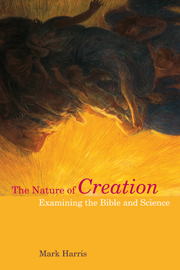Book contents
- Frontmatter
- Contents
- Preface
- Abbreviations
- 1 Introduction
- 2 Creation According to Modern Science
- 3 Creation According to the Bible I: Genesis
- 4 Creation According to the Bible II: The Creation Motif
- 5 The Framework of Biblical Cration
- 6 Creator–creation: How can a Ralationship be Described?
- 7 The Fall
- 8 Suffering and Evil
- 9 Scientific Eschatology and New Creation
- 10 Conclusions
- Bibliography
- Index of Ancient Citations
- Index
5 - The Framework of Biblical Cration
- Frontmatter
- Contents
- Preface
- Abbreviations
- 1 Introduction
- 2 Creation According to Modern Science
- 3 Creation According to the Bible I: Genesis
- 4 Creation According to the Bible II: The Creation Motif
- 5 The Framework of Biblical Cration
- 6 Creator–creation: How can a Ralationship be Described?
- 7 The Fall
- 8 Suffering and Evil
- 9 Scientific Eschatology and New Creation
- 10 Conclusions
- Bibliography
- Index of Ancient Citations
- Index
Summary
NATURAL AND SUPERNATURAL
Through the next two chapters we will explore how the Bible's creation texts may be integrated into modern discussions in the science–theology field, first by discussing ways of understanding the scientific framework of the biblical texts, and then the theological framework.
Although we might find it straightforward to distinguish scientific from theological talk in our culture, it is not so straightforward when we come to the Bible, since much of the scientific framework of ancient Hebrew thinking was couched in theological terms, and vice versa. Take the categories natural and supernatural, our standard vocabulary for speaking of the material world against the idea of a spiritual world; of the ordinary scheme of things (“natural”) as against miracles (“supernatural”). There is a degree of ambiguity in these terms, just as there is ambiguity in the term “nature” (McGrath [2002] 2006a: 81–133). Does “nature” refer to the world of wildlife – the flora and fauna of the earth which exist apart from humankind – or is it a technical term for all that comes under the remit of science? Or is it a theological term meaning all of creation which stands apart from God?
Here we will take a natural event to be an event which is describable by science through the usual scientific method of experimentation and testing of hypotheses. In which case, we might be tempted to say that a supernatural event has no clear natural (scientific) explanation on any level; it is caused by powers above (super) this world; we would be likely to identify a spectacular miracle narrative as evidence of the supernatural.
- Type
- Chapter
- Information
- The Nature of CreationExamining the Bible and Science, pp. 83 - 110Publisher: Acumen PublishingPrint publication year: 2013



